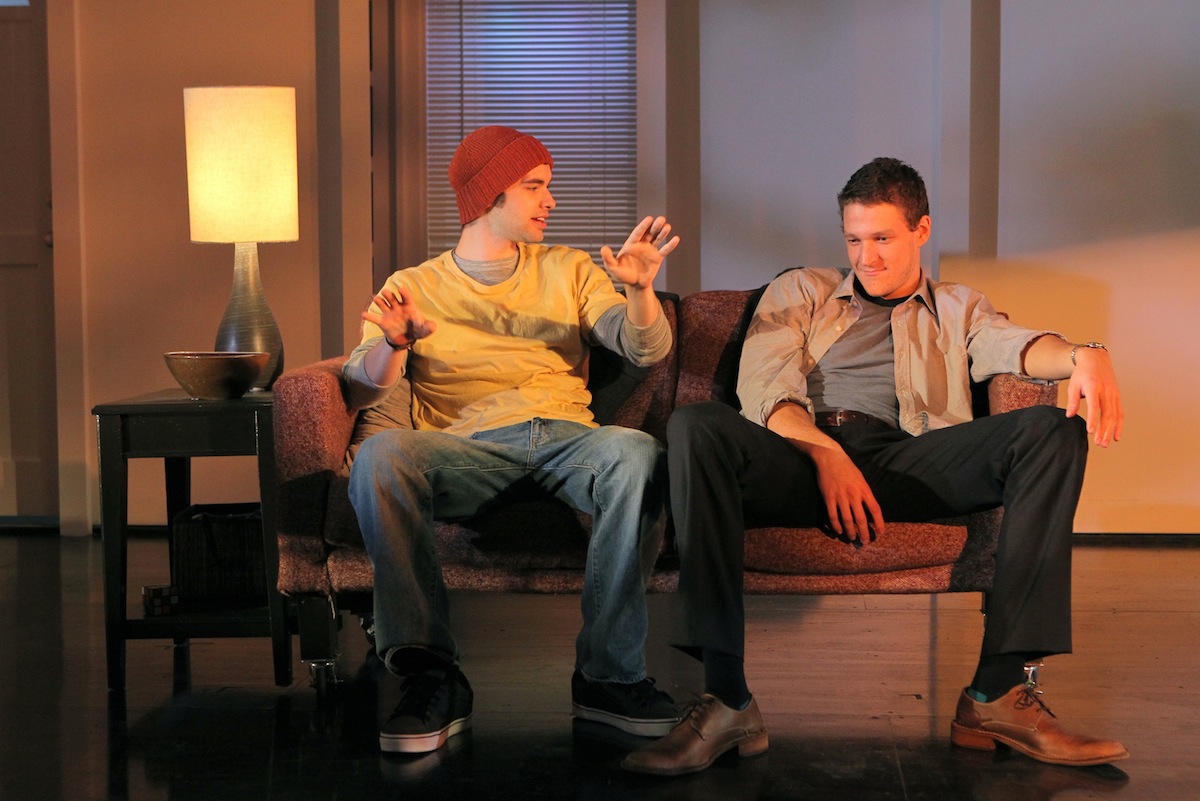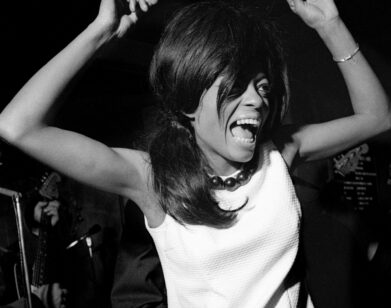Jake O’Connor’s Notes from Underground

JAKE O’CONNOR (LEFT) WITH GABRIEL EBERT IN SUICIDE, INCORPORATED
PHOTO COURTESY OF JOAN MARCUS
With “Suicide, Incorporated,” playwright Andrew Hinderaker sculpts a story that lures viewers into a morbid world—but with a laugh. Set at a start-up company where composing the perfect suicide note is the holy grail, one employee, Jason, just can’t seem to turn down his human compassion. Here, optimism is no attitude for the workplace—do recall the title.
At the crux of the narrative is actor Jake O’Connor’s character, Tommy. O’Connor has appeared on TV shows like Fringe and Gossip Girl, as well as the Anna Paquin and Mark Ruffalo drama Margaret, but live theater has truly allowed him to delve into character. (He performed off-Broadway in “The Dream of the Burning Boy.”) Here O’Connor, who plays the college-aged little brother to Gabriel Ebert’s Jason, manages the complexities of youth and brotherly bonds with finesse. We caught up with him on his day off to talk about preparing for emotionally heavy roles, forging quick, crucial and earnest relationships with co-stars, and being up close and personal with your audience.
MERYL CATES: “Suicide, Incorporated” is such a journey—it’s funny and it’s emotional. What was your initial response to the play?
JAKE O’CONNOR: Well I originally read the play while I was working on “The Dream of the Burning Boy,” the last Roundabout Underground show. I was asked to do a reading of it. As soon as I read it, I was blown away by it. So many things went through my head, I didn’t even know what to think, but my mother actually works in grief counseling, so I have a lot of specific opinions about these sorts of things. I thought that it really accomplishes something that I hadn’t seen in a play before. At that point I began to do my best to convince everyone from the Underground to keep me involved, because I was just very, very enthused about it. So I hoped that I would be able to contribute to the telling of that story.
CATES: Since seeing it, the play has really lingered with me. It deals with such serious material—the title lays it all out there. But, what are your thoughts? It relies very much on the “everything is not what it seems” notion.
O’CONNOR: Right, well, it was interesting to me, because as much as I’ve grown up with these sorts of things around me, I’ve never known the statistics of completion rates of suicides being so much higher with men. And especially the notion of men not speaking up, and holding things inside. It makes a lot of sense.
CATES: So how did you prepare and get into the role? Your character, Tommy, had to have been so troubled, but you also brought this amazing serenity.
O’CONNOR: I did a lot of different things, I did a lot of talking with the writer and director [Jonathan Berry] and sort of just bonding with the other cast members. I’ve been so fortunate on both shows to have just these wonderful casts of supportive people. There’s not a single person from either of the Underground shows that I’ve done that I don’t consider a good friend of mine. I have experience in my life with being in a dark place. I have experience with being very close with someone—I have an older sister, and she is a huge lifeline of mine, and a huge support system in my life. So that helps a lot with my relationship with Jason in the play, because our parents [in the play] passed away when we were very young, and so he raises me. Although my parents are both around, my sister has certainly been someone who’s helped me, and an advisor of mine, for my whole life. So that was a helpful thing as far as the relationship between me and my brother in the play, which is obviously a huge part of it.
CATES: The play did well in Chicago [where it premiered in 2010]. Were you at all affected or influenced by how Tommy was acted there? Chicago Tommy if you will…
O’CONNOR: I honestly avoided ever really knowing anything about Chicago Tommy’s performance. I never saw the show, and I never really asked Jonathan or Andrew about it, because this is a fully new production, and they said that from the start that they were not going to try to recreate what they’d done in Chicago, but to create the show as they see it now. It is a new play, and that’s the whole part of the process of working on new plays, which is very interesting as an actor, is that you are always finding new things. Throughout this whole preview process, we are rewriting.
CATES: So it’s continually evolving. There’s still rewriting going on?
O’CONNOR: Yes. It’s getting more and more nailed down, but the rewrites, I think, have been great. As an actor, I very much enjoy the process. It keep you on your toes, because you might get a few new lines a little while before you go on stage. And some people might be bothered by it, but I think it keeps me sharp and allows me to keep myself as focused as I can be. I really care about the material, and that’s obviously something that’s important to me.
CATES: Your only interaction is with Gabriel Ebert, who plays your brother, whom you share this pronounced closeness with. How did you both work on developing this important bond?
O’CONNOR: I’ve taken some walks with Gabe, and we chat. Right off the bat, I got along great with him. It really wasn’t too hard to find that sort of bond, because I do think we have a lot in common in certain ways, and we’re also very different in a lot of ways. But that’s sort of how Jason and Tommy are as well. A lot of it was a passive thing of just being open with each other as friends and then working with our director Jonathan in finding some of the more specific aspects with regard to the characters as opposed to the people.
CATES: And long walks always help.
O’CONNOR: [laughs] Right.
CATES: You’ve done work on TV and movies, but this is theater, which is totally different. So what’s so fantastic about Suicide, Incorporated is the Black Box Theatre. It couldn’t have been more intimate.
O’CONNOR: No, and the great thing is they do an incredible job, [producers] Robyn Goodman, Jill Rafson, and Josh Fieldler, and everyone from the Underground, when they choose these plays. Both plays [“The Dream of the Burning Boy” and “Suicide, Incorporated”] are very intimate plays. And the way that the sets are constructed, the way that it is so close to the audience, absolutely helps to tell the story.
CATES: That must take some getting used to, though, being so close to the audience. Do you have to psych yourself up?
O’CONNOR: When I did “Burning Boy,” it was a little strange at first, because we had classroom scenes; and the way they set up the chairs, I played a student, were right in front of the front row of the audience. We had a row of classroom seats with our backs facing the audience, so it was basically like the audience was the rest of the class, which was very interesting and I thought genius on the part of the design. I’d say I got used to it during that show, that sort of intimacy, and having so little space between you and your audience. So on this show, especially because I have so much focus on my brother, it hasn’t been too hard for me to believe that I’m hanging out in my brother’s apartment with him, just fooling around.
CATES: Do you think that close environment between audience and actor in this theater fosters a relationship and mood important to “Suicide, Incorporated?”
O’CONNOR: I couldn’t think so more. I think it is just perfect for every aspect of what the play is trying to do. I think it’s great for the audience, and I think it’s great for the cast.
SUICIDE, INCORPORATED OFFICIALLY OPENS TOMORROW AT ROUNDABOUT UNDERGROUND. FOR MORE ON THE PLAY VISIT ROUNDABOUT’S WEBSITE.






